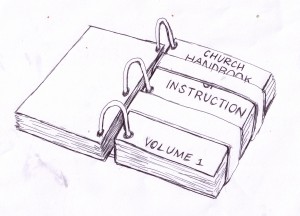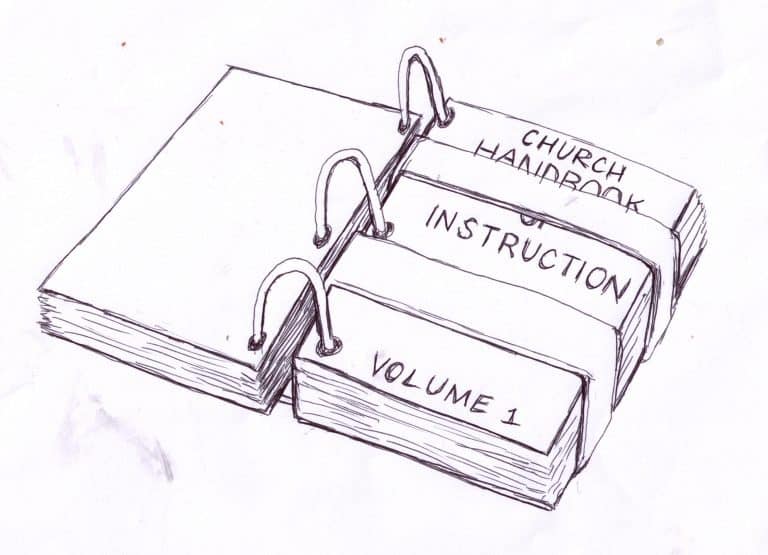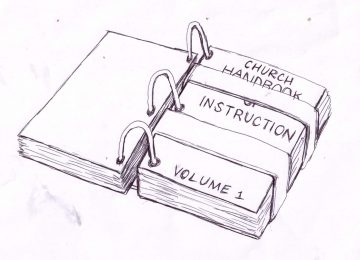How many men and women are allowed to read Church Handbook of Instruction Volume 1 (CHIv1) of the Church of Jesus Christ of Latter Day Saints? Within the introduction of CHIv1, there is a section titled Distribution, which lists the persons authorized to read this volume of church policy and specifies that “it should not be duplicated or given to any other persons.” I used statistics from LDS.org to determine the number of people by sex who are included in this list. My data are incomplete because I had trouble finding any information at all about the nonecclesiastical, corporate structure of the church, so I was unable to fill in numbers for Church Department Heads or for Directors of Temporal Affairs. However, I easily accessed numbers for the other categories listed.

The lucky individuals granted access to this volume include:
| Men | Women | |
| General and Area Authorities |
158 |
0 |
| Area Seventies |
420 |
0 |
| General Auxiliary Presidencies |
6 |
9 |
| Church Department Heads |
? |
? |
| Directors of Temporal Affairs |
? |
? |
| Temple Presidencies |
423 |
0 |
| Mission Presidencies |
1,215 |
0 |
| Stake Presidencies |
9,087 |
0 |
| District Presidencies |
1,704 |
0 |
| Stake Clerks |
3,029 |
0 |
| District Clerks |
568 |
0 |
| Bishoprics |
64,716 |
0 |
| Branch Presidents |
7,465 |
0 |
| Ward Clerks |
21,572 |
0 |
| Branch Clerks |
7,465 |
0 |
| Totals |
117,828 |
9 |
What does it mean for women in the church, when so few of us are allowed to even read the policies that govern us? Transparency is key to preventing abuses in any system of governance and CHIv1 includes numerous policies that affect rank and file members of the church. (Play CHIv1 Trivia to learn about some of these policies.) Those of us who are unauthorized to read CHIv1 are at the whim of those in power, who may or may not accurately disclose them to us. Many men have the opportunity at some point in their lives to serve in a capacity that would allow them access to CHIv1. A man may be able to rebut a church leader who inaccurately applies church policy and the leader may assume he garnered his information in some prior calling. A woman cannot make such a policy rebuttal without disclosing that she read a policy manual that was forbidden to her.
With so few women even allowed to read CHIv1, I think it is safe to assume that the policies contained within its pages are largely written by men and not women. Male bias is evident in several of the policies found within the volume. Take these examples:
Temple Sealing Policies
CHIv1 rules that a man may be sealed to multiple women but a woman may only be sealed to one man. However, after her death, she may be vicariously sealed to all the men she was married to during her life. Thus, it appears that there is no eternal, theological reason for preventing a woman who remarries from being sealed to more than one man. So why force widowed women who love their second husbands to cross their fingers and hope that someone else will vicariously perform this work? My guess is that church policy only allows living women to be sealed to one man because the thought of being a plural husband is repulsive to men and men are the ones writing these policies. Is the thought of being a plural wife repulsive to women? Well, that’s not relevant, is it?
Temple Ordinance Worker Policies
CHIv1 forbids American and Canadian mothers with minor children at home from serving as temple ordinance workers. No such restriction exists for fathers. Benevolent men have explained to me that this policy is intended to avoid overburdening mothers. They’re banning us for our own good, ladies! But does this policy actually help women, when viewed from the female perspective? Several stay-at-home mothers have informed me that spending time at the temple while their husbands care for the children would be welcome repose for them. In contrast, having their full-time employed husbands spend even more time away from home because of temple service is a burden indeed. And does it occur to men, who have such ample opportunities to perform priesthood ordinances at home and church, that temple ordinance work is currently an LDS woman’s only approved venue to perform priesthood ordinances? This policy prohibits most American and Canadian women from accessing their only opportunity for performing priesthood ordinances for 18-30 consecutive years of their adult lives.
Church Discipline
Is it ethically defensible that the guidelines for church discipline, including the rights of the accused, are contained within the sealed pages of CHIv1? The consequences for accused people under church discipline can be dire: the loss of church membership and the invalidation of all of their covenants and ordinances. Yet, most male church members and nearly all female church members must depend on their accusers to inform them of their rights and may not read CHIv1 to verify that their accusers disciplined them in accordance with church policy.
Now you’re thinking, “Hey, April was never a general auxiliary leader! And here she is critiquing CHIv1! She didn’t follow the rules!” Good observation, reader. I read CHIv1 as an act of civil disobedience. I believe people should be allowed to read policies that govern them. I believe that even female people should have this right. The Church seems to half-way agree with me; half of its policies, those found in CHIv2, are accessible online. Based on my own reading of CHIv1, there isn’t any good reason why CHIv1 should be a sealed book. It does not contain anything so sacred or titillating that it needs to be hidden from public view. Like all policy manuals, it’s a dull read. Let’s get those boring pages out in the open where male and female church members alike can see them, discuss them, and maybe even improve them.






29 Responses
Sharon Eubank is the first woman to serve as executive director of LDS Charities, just appointed a few months back. From my understanding there are no other women as Church Department Heads.
Thanks for remembering her, EmJen! It brings the total number of women who have access to the CHIv1 to…ten.
And April, thank you for doing the math and giving us a chart. It’s so nice to see data arranged so it’s easy to interpret and understand.
If this is the book we are judged by, it is to the benefit of the entire church to have every member read it openly. Restricting it only increases the possibility of incidents of unrighteous dominion throughout the church (D&C 121). Knowledge is power.
Thanks Emjen! I am glad to see that the number of women with access is at least in double digits, and it is good to hear that the church is appointing at least one woman to a position of corporate authority.
I haven’t finished reading the post yet (and I will), but it is my (possibly overly optimistic) belief that mission presidents are called and set apart as a couple, and so there should be numbers in the “women” side of that column. (I was friends as a young woman with a girl in my ward because her parents were the mission presidents, and they were definitely both referred to as presidents). I’m not sure about temple presidents, but possibly them also?
That is an interesting thought. My guess, however, is that the wives have access only if their husband thinks it appropriate. I served a mission, and even though they were called together we certainly never called the wives (I served under 2 presidents) “President X.” Always “Sister X.” They had no official role either, other than cooking a large meal your first and last nights there. They could be assigned things, like one mission president’s wife changed our clothing rules to be stricter than what the official policy was. So I am guessing they are not issued a manual — what would they need it for? They aren’t presiding in any actual sense, at least not universally or officially.
I think it likely that some progressive male mission presidents and temple presidents may share their copy of CHIv1 with their wives, but it doesn’t appear to me that this is church policy. The official title of a mission president’s wife is “Sister” (just like the young female missionaries) and the official title of the temple president’s wife is “Matron.” This 2005 quote by Elder Oaks, that was included in the Young Women curriculum last month, makes it clear that Elder Oaks does not consider the mission president’s wife to be a co-president:
“I have also seen some faithful women who misunderstand how priesthood authority functions. Mindful of their partnership relationship with their husband in the family, some wives have sought to extend that relationship to their husband’s priesthood calling, such as bishop or mission president.”
I would love to hear from any former mission matrons or mission presidents’ wives. Did you have a copy of CHIv1?
Kind of a late response here, but the distribution list says:
Mission Presidency (3 copies)
Temple Presidency (4 copies)
So, divide those as you will among counselors/APs and figure out if there are copies for wives or if wives/matrons just borrow their husband’s copies as needed.
“I believe people should be allowed to read policies that govern them. I believe that even female people should have this right.”
Amen!
This is pretty damning evidence of women’s exclusion. It really is appalling that women have so very little access to the first volume. What on earth could be the reason to keep the book out of the hands of most members? What is wrong with all members knowing these policies? It’s a head-scratcher, that’s for sure.
You are right to point out that there are some very clear and troubling gender inequities present in this handbook. It’s particularly upsetting to think about the imbalance in sealing practices. They need to either completely do away with multiple sealings for everyone (my preference) or allow women to have the same opportunities as men for multiple sealings.
I am under the impression that anyone can read it, by request. The actual availability may vary bishop to bishop, but we are allowed to read it.
And you cast church disciplinary councils in a very bad light. Any outcome is not to be considered punishment, but rather a merciful way to reduce any more negative eternal consequences for the individual in question. If they are breaking certain serious covenants with no foreseeable plan to repent, it is better that they be released from those covenants, so as to keep their pit shallowest and to protect any members under their influence.
I would definitely encourage members to ask their bishops to let them read CHIv1 and I hope many bishops would honor their request. However, I do not share your impression that CHIv1 is intended to be shared. CHIv2 is online and the Church could easily post CHIv1 online as well but chooses not to. Also, consider this quote from the CHIv1 Distribution section:
“This handbook has been prepared solely for use by general and local church officers to administer the affairs of the church. It should not be duplicated or given to any other persons.”
As for whether church discipline, including the invalidation of covenants, is a good thing or a bad thing, that was not the focus of my post. My focus was on whether it is good or bad that members may not read the policy book that contains the disciplinary policies.
If your bishop is overstepping his bounds of authority, or if your church disciplinary actions are going beyond the mark, you will never know that unless you know what the official rules and procedures are. And if your local leaders happen to be the punitive, vindictive types most likely to be abusive of their power, they aren’t going to volunteer to show you the rules to begin with. (And may, in fact, make it particularly hard for you to get access to them at all.)
And, really, in what other organizations are adults required to ask permission to see policies governing their participation in said organization? When you’re hired at a job or begin work as a volunteer somewhere, the first thing the HR folks do is hand you a copy of the employee/volunteer handbook and grievance procedures. Then they tell you where it can be found, in full, in electronic format, so you can access it at your leisure, whenever you want to.
I was a Bishop for 7 years and would happily share the contents of Volume 1 when asked or as appropriate. As far as Disciplinary Councils are concerned, they are Councils of love and designed to help an individual towards exaltation. Before each step of the process we would read the sections in the Handbook together so that they understood what was to happen next. We would also read any notes that I had taken during interviews to ensure accuracy and as an opportunity to correct any misunderstandings or omissions. A Disciplinary Council is NOT adversarial nor are the steps intended to surprise the individual. The processes as outlined in the Handbook were read and explained fully so that the individual could prepare for each step and so that they understood what I, as the Bishop and the representative of the Church, would be looking for. Some of my profoundest and strongest spiritual experiences happened during Disciplinary Councils not, as I believe, that they were for my benefit but I was a bystander to the Spirit communicating to the individual that they were doing the right thing.
Thank you for all the work you all do at The Exponent – I am currently serving as HPGL and always access The Exponent as I prepare for Priesthood lessons.
I often feel that the “sealed” handbook is like playing a game where you don’t know all the rules. Certainly it’s not “light and truth” is it?
Thank you so much for giving this perspective. As an attorney I am increasing aware of the importance of due process and transparency to give some semblance of fairness. This is extremely unfair.
Well, how ’bout that?! But, really, this isn’t a surprise. If the manual is intended for leadership use and leadership is comprised almost exclusively of men, then men will be the ones reading it.
I agree with you, by the way. On all points. Why is ANY official publication involving church policy not easily and publicly accessible? To everyone. All the time.
Also: what Caroline said about the temple sealing thing.
This is brilliant, April! The table at the top really says it all. It’s a book by men and for men, which wouldn’t matter except that as you show, it touches so often on the lives of women.
There seems to be some intermingling of two different issues: access to the handbook vs. what is in it.
As far as the temple sealing policies, that is not information that is only found in the handbook. It is openly available in family history manuals, on the web, etc. One may disagree with the policy, but it is not being hidden from anyone.
Most every organization with which I am involved, from political groups to my workplace, has online programs and manuals for leaders, technicians, and others with specific job titles. Some of these are even numbered manuals that have to be accounted for when an employee leaves. It does not strike me that the church is doing anything different than other organizations. And it isn’t that those who have them are “lucky” to have access; it is just a tool for their job.
A friend explained to me that in his view the handbook is not for members, but rather for leaders to counsel with members who seek the leader out. Between the two is a huge space that is not all bad for members. For example, some years ago I made a choice prayerfully, and felt as good about it as any decision for which I have received a strong spiritual confirmation. Years later when I happened to have access to the handbook, I discovered that my decision was “discouraged.” I asked my friend who had been in the bishopric why he had not brought that counsel to my attention, since he knew about my plans through our personal connection. His answer was that I had done exactly what I was supposed to do, pray about it myself. He could tell through the spirit that I was at peace and it was right for me. And I had not asked him for counsel. If I had asked him about it in his capacity as a leader, he would have relayed what was in the handbook. But in his opinion, the church is better off with people learning to pray and receive revelation on their own than be dependent on written rules.
Yes, it would be a huge problem if we were somehow being forced to walk in the dark, with guidance that we need being hidden from us. But is that so? Most of what is in the handbook seems a natural outgrowth of what is public knowledge, with a few more details for people in administrative positions to do their jobs.
But I could be wrong. For those of you who have read the handbook, what parts made you better disciples of Christ, that you wouldn’t otherwise have known?
It is interesting that you mention having a spiritual experience that guided you toward a decision “discouraged” by the Handbook. I had a similar experience that I described in Exponent II Magazine: http://www.exponentii.org/wp-content/uploads/2011/12/winter-2011-corrected-12-13-01.pdf I believe the best thing the church could do to encourage people to make personal decisions using their own agency and personal revelation would be to delete all of the CHI policies that allow for personal agency, but also offer a “discouraging” frown toward those who choose differently than CHI authors would have. Then the content of the CHI would be improved to better support personal agency. I think such a change would better support agency than hiding the book.
I think the Church does, for the most part, encourage this. I am not sure everyone wants that though. Many want the leader to tell them what to do, and often the leader can’t. Divorce for instance. The handbook is quite clear that a leader may not give advice for, or against, but support the choice made.
Anyone who believes another’s choice is wrong should keep their mouth closed. It is none of their business.
Side note:- I read your linked article and it is a lovely story. I can to a small degree put myself in your husband’s position and know that he can’t possible love them any less then if they were his natural children. Whilst I love my sons-in-law for the why they love my daughters, and care for them, they are not physically anything like me, or in many other ways. So to an extent my grandchildren are like children with donor sperm (I do understand the difference). There are things about them that make them very much their fathers’ children. But they mean every bit as much to me as my own children.
As you say, knowing the spiritual heritage of our children (natural, donated, adopted) gives us that link to deity. Out mission for them is the same.
[…] 42 An even smaller ratio of women is allowed to read the complete volumes of church policy. 39 43 Since women may not read church policy, it is safe to assume that women are not writing the […]
[…] This week’s Equality is not a Feeling post illustrates the number of males and females who have access to the Church Handbook of Instruction, volume 1. This is based on data from the following post by April on Exponent II: The Sealed Book. […]
[…] quite common among Mormon women and not at all unique to me. Policy certainly plays a role here; differential temple sealing policies for men and women continue to terrorize Mormon women with the threat of eternal […]
[…] equally with men in LDS Church policymaking. Current policy is written almost exclusively by men, with almost all women in the church banned from even reading many church policies. As such, it is not surprising that church policy is biased toward protecting men from false […]
[…] be to the logistics of church meetings and events to the policies found in the Handbook they’re not allowed to read. Priesthood leaders, from the highest echelons in Salt Lake down to lay local leaders across the […]
[…] And when I say “church leaders,” I am almost exclusively talking about men. At one point, I researched the numbers of men and women within the church with access to this sealed policy manual…. This lack of transparency meant that women had to rely on males with authority over them to […]